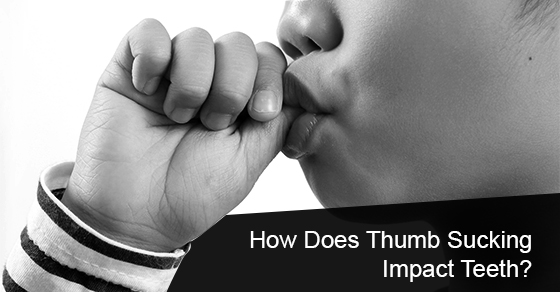
Lots of babies and small children suck their thumbs. Like using a pacifier, it can be very soothing to have something to chew or suck on. Even adults do it, but we tend to chew on pens or other items.
The major concern most parents have with thumb sucking is whether it will impact their child’s teeth or not. As a parent, you don’t want to take away something that comforts your child, but you also don’t want your child to cause any permanent damage to their mouth or teeth.
At Oakville Place Dental, our experienced pediatric dentists only want the best for your child, and to help your child develop good dental habits early in life. To help put your mind at ease, and let you know when it may be time to seek help, we’re going to talk about the following:
Babies actually start sucking their thumbs even before they are born. It’s a reflexive behaviour, and babies find it quite soothing. So, they continue to do it after they are born, or they may switch to a pacifier if one is available.
Thumb sucking can continue into the toddler years. Toddlers will use it to self-soothe in stressful or unpredictable situations. They also suck their thumbs if they are bored, anxious, or tired. A lot of babies and toddlers suck their thumbs to help settle themselves down to sleep.
Babies and toddlers may also increase thumb sucking when they start daycare for the first time. They are anxious at being separated from their parents and turn to thumb sucking as a familiar soothing method in a strange place.
Kids’ dental hygiene is important. This means it’s never too early for you or your child to start learning about it, and that includes the causes of thumb sucking.
Most children stop thumb sucking somewhere between 2 and 4 years of age. If your child is past the age of 4 and still frequently sucks their thumb during the day, you should talk to their dentist. They can work with you to design treatments or strategies to help your child stop sucking their thumb.
The main concern with a child who is still consistently and vigorously thumb sucking past the age of 4 is that this action can affect the alignment of their permanent front teeth and the shape of their mouth. Damage can occur because of the repetitive pressure that thumb sucking places on the teeth, jawbone, and roof of the mouth.
The kind of damage that thumb sucking can cause depends on the age your child is and how often they do it. Here are the main types of damage thumb sucking can cause:
Perhaps you’ve tried repeatedly reminding your child to stop thumb sucking, and it hasn’t worked. Or, you’ve put bandages or mittens on their hands to discourage them, and that hasn’t worked either. If this is the case, and your child is still sucking their thumb regularly beyond the age of 4, it may be time for professional intervention.
At Oakville Place Dental, we have skilled pediatric dentists who will work with you and your child to help them quit thumb sucking. We can:
We take pride in making sure we work with you as a partner in your child’s dental needs. We will provide you with all the information you need to help you make the right decision for you and your child. As well, we’re happy to take the time to answer any questions your child may have both about thumb sucking and why it’s important in general to keep your teeth clean.
At Oakville Place Dental, we’ve been in business for over 25 years! We’re located in the Oakville Place Mall, with free and convenient parking. We offer all kinds of dental services, including kids’ dental.
We know that you only want the best for your kids, which includes having healthy teeth. If you have concerns about how long your child has been sucking their thumb, we’d be happy to talk to you. We’ll work with you and your child to figure out the best solution to help them stop sucking their thumb.
You can call us at 905-842-6030 or contact us here. Whether it’s for a cleaning, teeth whitening, an emergency appointment, cosmetic dentistry, and more, we can help!
 0 Comment
0 Comment